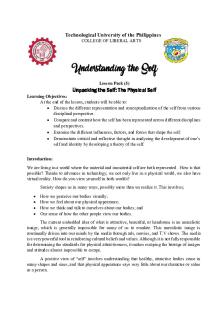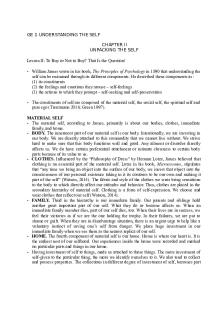Understanding The Self Lesson 3 PDF

| Title | Understanding The Self Lesson 3 |
|---|---|
| Author | Marcella Grace Dulce |
| Course | Understanding the Self |
| Institution | Technological University of the Philippines |
| Pages | 3 |
| File Size | 188.5 KB |
| File Type | |
| Total Downloads | 95 |
| Total Views | 425 |
Summary
Technological University of the Philippines COLLEGE OF LIBERAL ARTSUnderstanding the SelfLesson Pack (3)The Self f rom Vari ous Perspective: Anthropol ogyLearning Objectives: At the end of the lesson, students will be able to: - Discuss the different representation and conceptualization of the self ...
Description
Technological University of the Philippines
COLLEGE OF LIBERAL ARTS
Unde Understanding rstanding the Sel Selff Lesson Pack (3)
The Self from VVarious arious Perspecti Perspective: ve: Anthropology Learning Objectives: At the end of the lesson, students will be able to: • Discuss the different representation and conceptualization of the self from various disciplinal perspective. • Compare and contrast how the self has been represented across different disciplines and perspectives. • Examine the different influences, factors, and forces that shape the self. • Demonstrate critical and reflective thought in analyzing the development of one’s self and identity by developing a theory of the self.
ANTHROPOLOGY The Self and the Person in Contemporary Anthropology What is Anthropology? What is its view about the concept of self? Anthropology is the study of people, past and present. It focuses on understanding the human condition in its cultural aspect. In general sense anthropology is concerned with understanding how humans evolved and how they differ from one another. Anthropology is a very dynamic field, and anthropological literature offers several different definitions of self. This discussion, however, will tackle the widely acceptable definitions of self in modern anthropology. A Unit but Unitary One definition of self in modern anthropology characterizes the term in its most general, ordinary, and everyday use. Anthropologist and professor, Katherine Ewing (1990), described the self as encompassing the ‘physical organism, possessing psychological functioning and social attributes.’ This definition portrays the self as implicitly ad explicitly existing in the mind comprised of psychological, biological, and cultural processes.
Neuroscientist Joseph LeDoux (2002) conceptualized the implicit and explicit aspects of the self. The aspect of the self that you are consciously aware of is the explicit self while the one that is not immediately available to the consciousness is the implicit aspect. This concept can be traced to the famous psychologist Sigmund Freud’s level of consciousness; however, LeDoux’s view on how the self was developed asserted that it is framed, maintained and affected biologically, mentally and socially. According to LeDoux (2002), the self is not static; it is added to and subtracted from genetic maturation, learning, forgetting, stress, ageing and disease. This is true of both the implicit and explicit aspects of the self. Self as Representation Ewing (1989) asserted that a self is illusory. People construct a series of selfrepresentations that are based on selected cultural concepts of person and selected chains of personal memories. Each self-concept is experienced a whole and continuous, with its own history and memories that emerged in the specific context to be replaced by another self-representation when the context changes. By self-representation, Ewing meant culturally shaped self-concepts that one applies to oneself; it is the mental entities that are supposed to represent the self. According to Ewing (1990), people from all cultures have been observed to be able to rapidly project different self-representations, depending on the context of the situation. The person is unaware of these shifts; however, he/she will still experience wholeness and continuity despite these shifts. The Self Embedded in Culture How individuals see themselves, how they relate to other people, and how they relate to the environment are deeply defined by culture. If one finds the view that the self is a product of society, then it is plausible that the ways of how the self is developed are bound to cultural differences as well. Cultural anthropologists have argued that the self is culturally shaped and infinitely variable. “Cultural traditions and social practices regulate, express and transform the human psyche, resulting less in psychic unity for humankind than in ethnic divergences in mind, self and emotion” (Schweder, 1991, p. 72). The basic idea is that the principles of how the mind works cannot be conceived of as universal, but that it is as varied as the culture and traditions that people practice all over the world. Cultural Psychologists distinguished two ways of how the self is constructed. These are the independent and dependent constructs. These self-construal’s are also embedded in culture. Construal is an interpretation of the meaning of something; hence, in the sense, the meaning of self. The independent construct is characteristics of individualistic culture, such as in North America and Europe. Individualistic culture represents the self as separate, distinct with emphasis on internal attributes or traits, skills and values. The interdependent construct is typical of collectivist culture in East Asia stressing the essential connection between the individual to other people.
Developmental psychologist Catherine Raeff (2010), believed that culture can influence how you view: relationships, personality traits, achievement and expressing emotions. Relationship Culture influences how you enter into and maintain relationships. For example, relationship may be seen as voluntary or as duty-based. In Western societies, it is essential for a person to choose whom to marry while some Eastern societies still practice arranged marriage. Personality Traits Culture influences whether (and how) you value traits, like humility, self-esteem, politeness, assertiveness, and so on, as well as how you perceived hardship or how you feel about relying on others. Achievement Culture influences how you define success and whether you value certain types of individual and group achievements. Expressing Emotions Culture influences what will affect you emotionally, as well as how you express yourself, such as showing your feelings in public or keeping it private.
REFERENCE:
Otig, V. S., Gallinero, W. B., Bataga, N. U., Salado, F. B., & Visande, J. C. (2018). A Holistic Approach in Understanding the Self. Malabon City, Philippines: Mutya Publishing...
Similar Free PDFs

Understanding The Self Lesson 3
- 3 Pages

Understanding The Self Lesson 8
- 6 Pages

Understanding The Self Lesson 9
- 10 Pages

Understanding The Self Lesson 5
- 4 Pages

Understanding The Self Lesson 11
- 14 Pages

Understanding The Self Lesson 1
- 8 Pages

Understanding The Self Lesson 6
- 4 Pages

Understanding The Self Lesson 2
- 4 Pages

Understanding The Self Lesson 4
- 9 Pages

Understanding the Self- Reviewer
- 7 Pages
Popular Institutions
- Tinajero National High School - Annex
- Politeknik Caltex Riau
- Yokohama City University
- SGT University
- University of Al-Qadisiyah
- Divine Word College of Vigan
- Techniek College Rotterdam
- Universidade de Santiago
- Universiti Teknologi MARA Cawangan Johor Kampus Pasir Gudang
- Poltekkes Kemenkes Yogyakarta
- Baguio City National High School
- Colegio san marcos
- preparatoria uno
- Centro de Bachillerato Tecnológico Industrial y de Servicios No. 107
- Dalian Maritime University
- Quang Trung Secondary School
- Colegio Tecnológico en Informática
- Corporación Regional de Educación Superior
- Grupo CEDVA
- Dar Al Uloom University
- Centro de Estudios Preuniversitarios de la Universidad Nacional de Ingeniería
- 上智大学
- Aakash International School, Nuna Majara
- San Felipe Neri Catholic School
- Kang Chiao International School - New Taipei City
- Misamis Occidental National High School
- Institución Educativa Escuela Normal Juan Ladrilleros
- Kolehiyo ng Pantukan
- Batanes State College
- Instituto Continental
- Sekolah Menengah Kejuruan Kesehatan Kaltara (Tarakan)
- Colegio de La Inmaculada Concepcion - Cebu





